“Just so you know, we don’t serve chicken, we have no pork, no beef…”, a young waitress started reciting a seemingly endless list of missing menu items at 1000009 Thai Noodle Restaurant in Central Phuket. The two Western visitors, intrigued by the prospect of tasting a traditional Thai cuisine, faced an omnipresent Phuket Vegetarian Festival mantra: only vegetarian food available during the 9-day Taoist celebration locally known as Tesakan Gin Jae (sometimes spelled as Thetsakan Kin Che).
Meatarians insisting on finding a steak during the Phuket Vegetarian Festival exercise a much stricter diet than local vegetarians
As I was munching on quite a delicious vegetarian Pad Thai, I had no objections against the Jae / Jay Festival‘s effects on Phuket’s food offer. I was more surprised by the disappointment seen in the perplexed eyes of the tourists who couldn’t consume their desired meat protein. Rather than taking a dive into something new, they preferred roaming the streets and hoping to get luckier at the next eatery.
Yes, a strict vegetarian diet is a cornerstone of the Phuket Vegetarian Festival. Still, nothing is stricter than the conviction of those meatarians insisting on finding a steak in what clearly becomes a veggie town in those October days.
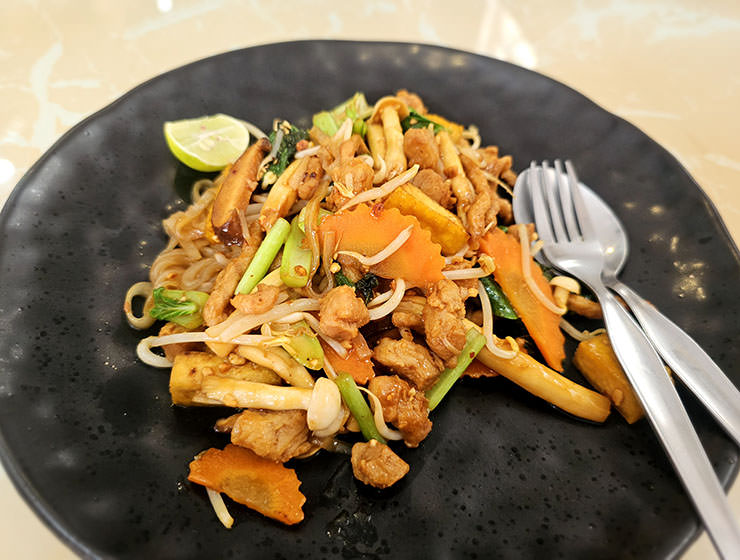
Nobody should stay hungry during the Jay Festival, however. Phuket roads, especially those leading to temples, are lined with stalls offering delicious food. This rich Phuket Vegetarian Festival buffet almost makes you wonder whether abstinence (manifested in avoiding sex and alcohol too) is truly the main prerequisite for purification. All those colors, scents, and flavors invite you to – indulge!
While many meat-centric restaurants and shops close their doors or turn vegan for a week, Jae is not a festival of starvation. Temples actually feed anyone who is hungry free of charge, while eating out in Phuket, often for just a dollar or two, becomes an exciting culinary adventure.
Learn everything you need to know about Phuket Vegetarian Festival food!
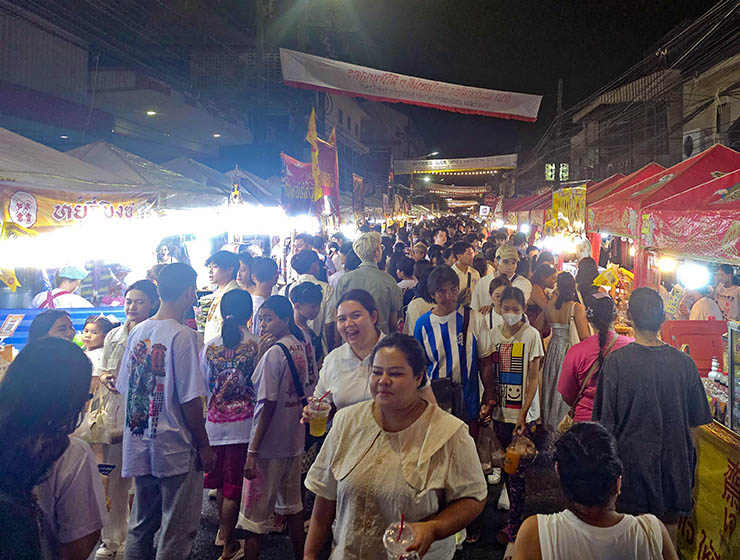
Going vegan is one of the great ways to reduce your carbon footprint when traveling.
Phuket Vegetarian Festival origin – from malaria to miracles
Today better known for its jaw-dropping rituals – think cheek-piercing processions and fire-walking ceremonies – Phuket Vegetarian Festival is an annual period for purification. In Taoist belief, those nine days in the ninth lunar month of the Chinese calendar (usually between September and October) are also known as the Nine Emperor Gods Festival, remembering a divine intervention from the early 19th century.
Phuket Vegetarian Festival originated when a traveling troupe of opera performers visiting Phuket from China‘s Fujian province fell ill with malaria (or cholera?) in 1825. Traditional medicine failed to help, so in a desperate attempt to regain their health, they adopted a vegetarian diet and performed various rituals and cleansing ceremonies to honor the pantheon of Nine Emperor Gods. Miraculously, they recovered and, since then, the locals have celebrated this “vegetarian miracle”, expanding it into a significant annual festival.
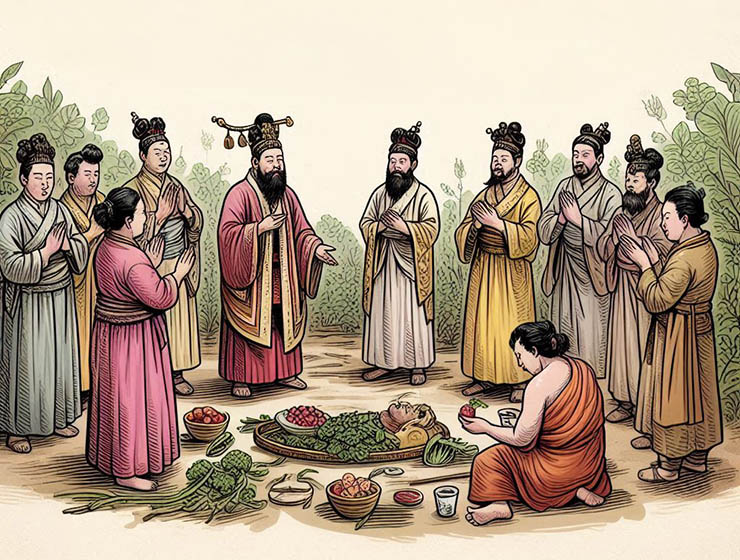
An alternative theory links the Phuket Vegetarian Festival’s origins to the Taiping Rebellion (1850-1864). The leaders of the Chinese who united to resist the Manchu-led Qing dynasty were killed, together with millions of others. Vegetarianism was supposedly introduced out of mourning for those who lost their lives.
Whenever Phuket Vegetarian Festival history really started, these customs have been passed down through generations of Chinese descendants in Southeast Asia, blending with local beliefs.
Today’s devotees, both Thai and Chinese, follow a strict set of rules for nine days, saying no to meat, alcohol, cigarettes, drugs, sex, profanities, lies, and other impurities. Besides dairy, eggs, and fish sauce, even certain types of pungent veggies, such as onion, garlic, leek, scallions, and chives, are on the banned list. Consuming chocolate and fizzy drinks is discouraged. Participants also adhere to wearing all-white clothing as a symbol of purity. These acts are believed to bring good health, prosperity, and spiritual peace to the community.
Thaipusam in Malaysia has a similar set of rules where devotees eat vegetarian food once a day for 48 days. Learn more about the Hindu piercing festival.
Vegetarian food stalls in Phuket
For visitors, the abundant plant-based meals are the highlight of the Phuket Vegetarian Festival. Hundreds of vegetarian food stalls spring up near the Chinese temples.
Probably the best street food in Phuket is served on Ranong Road, a section between Ranong Main Market and Jui Tui Shrine. Here, between 3 p.m. and midnight, the cars passing through are replaced with foot traffic, a hungry swarm of festival-goers navigating two lengthy rows of food stalls, each competing to win their taste buds.
Feel the atmosphere of the Phuket Vegetarian Festival street food market in our new YouTube series of uninterrupted Pipeaway Walks:
Phuket Vegetarian Festival street food market is occasionally interrupted by vendors offering flashy dragon toys and helium-filled balloons, leather purses, pyrotechnics, and cheap clothes (all white and light purple: temple-ready shirts and skirts for 100 baht, shorts for 50, trousers for 150). But the majority of goods traded are various meatless bites.
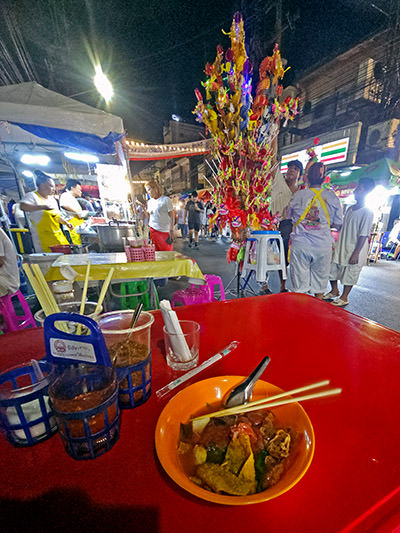
Food is normally eaten on the go. For my first try, I stop at a stall with plastic tables and chairs, a little al fresco pop-up restaurant. My plastic bowl is packed with noodles, veggies, mushrooms, crackers, and non-animal proteins. All quite delicious, and Thai-level spicy. Am I not glad I always carry my water bottle with me?
As I eat, it’s interesting to observe the well-oiled routine of this family operation. Everyone plays a role, from welcoming guests to a table, via flipping noodles and loading the garnishes, to washing the dishes (even here, in the street, someone has to do it).
My “lost in translation” lesson arrives when it’s time to pay. That big red “เจ” written on the yellow banner (not only on this stall) is not the price. I assume the lettering reads 17 baht. It does not. The 2-character sign is not even a number; it actually stands for – Jay (vegan). My noodles set me back 60 baht, still less than 2 dollars.
Do you want to learn how to cook vegetarian food Phuket-way? Join this well-rated vegetarian Thai cooking class!
Phuket Vegetarian Festival food menu
It’s hard to define the staple food of the Phuket Vegetarian Festival, as there are so many options to choose from. My eyes went wide at tom yum-flavored scones, taro-filled steamed buns, deep-fried corn, crispy vegetarian pork or squid, wonton dumplings stuffed with water chestnut, and a myriad of fried noodles and fake sushi rolls.
All sorts of skewers wait for you to pick them and throw on the barbecue, while a long line of patient customers seems to be a standard in front of the stall specialized in grilling king oyster mushrooms.
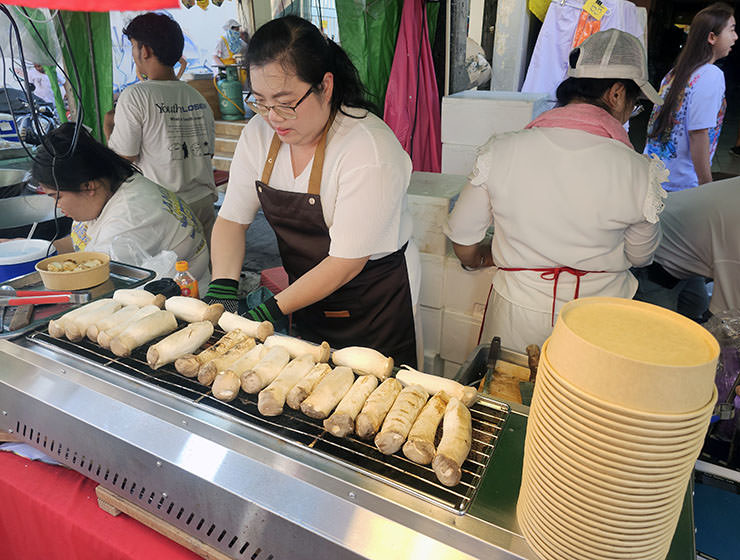
One vendor juggles a basket of French fries in one hand, a mic in the other, enthusiastically promoting them over the loudspeaker. The competition for your appetite is fierce.
From Korean gimmari rolls and Indian panipuri to Vietnamese savory crepes, from Chinese zongzi to Thai donuts, Phuket Vegetarian Festival is a whirlwind journey through the tastes of Asia.
Corn dogs and pastries shaped like dogs are here literally steps away. Well, as long as you don’t get diverted by a collection of socks or sunglasses for your puppy.
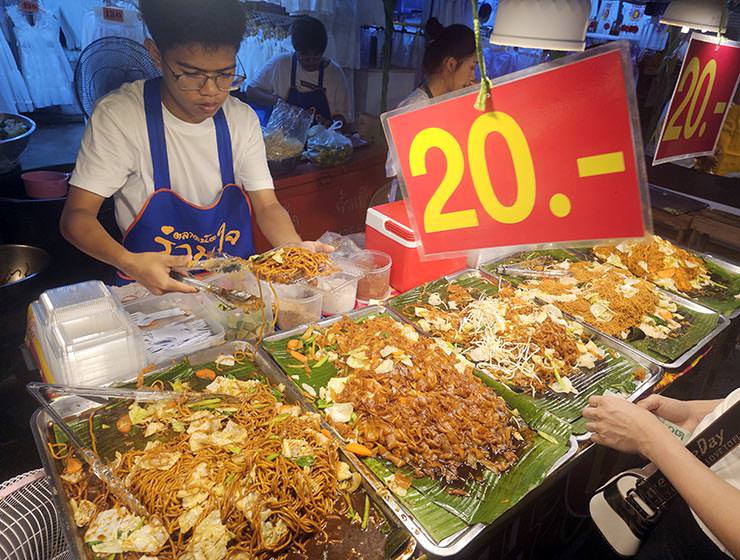
The sweet side of the Phuket Vegetarian Festival buffet
Croissants will range from puffy to flat. Ice creams from soft to hard.
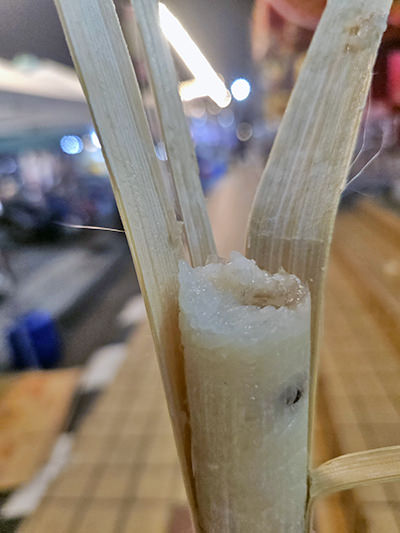
But to sweeten up my first-night experience at Phuket Vegetarian Festival, I try to avoid desserts with a Western world aura. Instead, I buy khao lam, sticky rice cooked in bamboo tubes, with coconut milk and black beans. Price? Just 30 baht.
Most prices here are a comfortable two digits, with the exception of grapes: a bunch is priced at 170 baht. You can save if you opt for a skewer, with exactly five grapes on it – that will be 35 baht!
Your skewer can also pierce strawberries, or mixed fruit jelly balls. If you like it Japanese-style, you can get your berries (or kiwi) combined with creme-fraiche in those triangle sandwiches, or wrapped in pillowy daifuku. For more kawaii creations, stuff your bag with luk chup, cute bite-sized fruits made of mung beans.
If you just like it raw, opt for sliced fruit. This is a great opportunity to even try durian, a smelly fruit that will typically invoke a heavy fine if you bring it to your hotel or hostel.
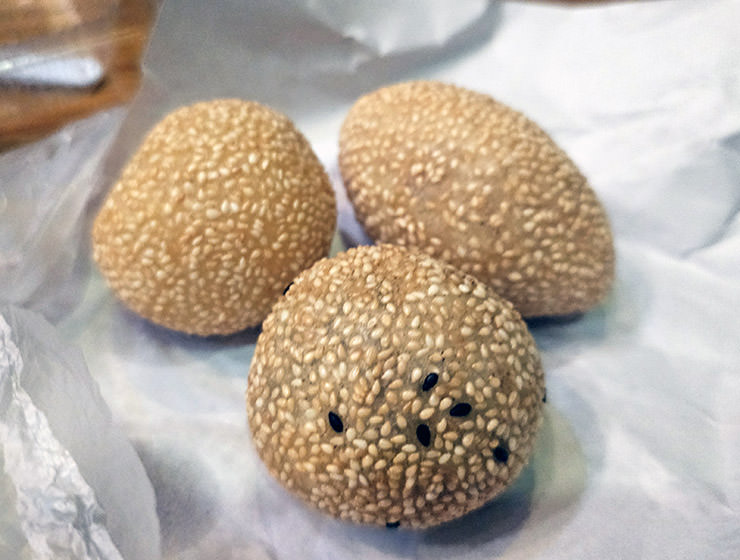
Beyond classics such as mango sticky rice or coconut pancakes (“Yummy, yummy”, endorses them their energetic baker), you can get your fruit-sourced vitamins in fresh juices covering all sweet bases – longan, guava, watermelon, sugarcane, and, of course, coconut water.
You can also cool off with an iced milk tea, a virgin mojito (remember, no alcohol!), a Coke slushy, or a healthier – bean smoothie. If you want to go eccentric, try craft cocoa with a hint of mint, or a butterfly pea juice – with glitter.
When in Chiang Mai, make sure to visit the upscale street food offerings at Nimman night markets!
Dining beyond the festival stalls – Vegetarian restaurants in Phuket
Beyond ubiquitous street food during the Phuket Vegetarian Festival, the town also has a surprising lineup of plant-based restaurants that operate year-round.
If you’re looking for a sit-down experience of vegetarian food in Phuket, you’ll find plenty of options that are, in fact, almost entirely vegan.
The highest density of vegetarian restaurants in Phuket is again on Ranong Road, close to Jui Tui Shrine. You might not see them easily during the festival, as they get overshadowed by food stalls placed in front of them, but they are certainly there!
Right at the corner with Soi Phutorn, I treat myself to a lovely meal at Luk To Vegetarian, for only 70 baht. I take rice with two vegetable add-ons (30), add a faux fish (10), and then three more sides from the fried section (tofu, veggies, and spring roll, 10 baht each). There is a language barrier here, but we managed to compose two plates that fill up my stomach. Water is free.
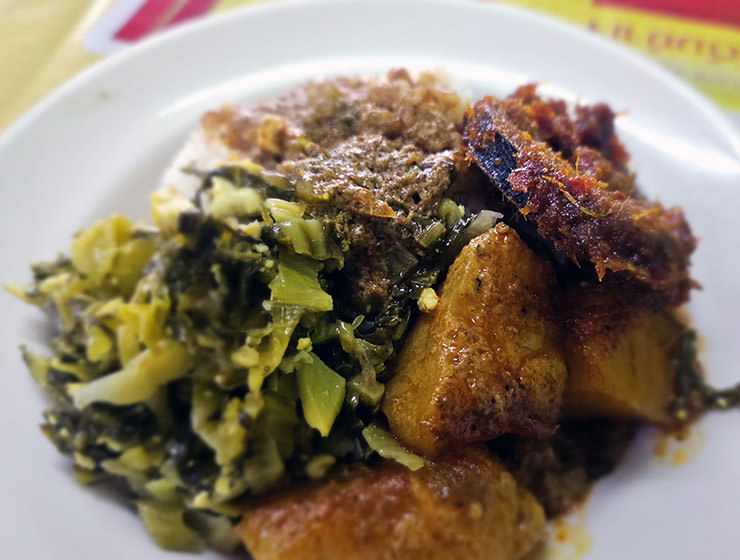
Phuket vegan restaurants offering a similar buffet of mock meats and veggies continue eastwards (Jia Chai Vegetarian Restaurant, Vegan Station, Ruamjai Vegan Restaurant, Hesan Vegetarian). As I pass by, they seem to be under renovation, with a humble food display, or finished for the day. Picking Luk To Vegetarian was a no-brainer.
Another solid, budget-friendly choice is Nong ‘J Vegetarian Restaurant on Patiphat Road. Here, for under 100 baht, you get an all-star cast of curries and mock meats: chicken, duck, pork, and even catfish. The setup might be simple (metal tables and fans), but with hundreds of five-star reviews, it’s clear this family-run gem knows how to wow a crowd.
If you’re looking into fancier vegetarian restaurants in Phuket, venture farther east. After the Suriyadey Circle roundabout, Ranong Road becomes Ratsada Road, and at the end, there is The Vegan Table. Here, you’ll find Beyond burgers, falafel wraps, vegan pizza and pasta, and even the vegan English breakfast. There are also drool-worthy cheesecakes and chocolate tarts, but prepare to pay more.
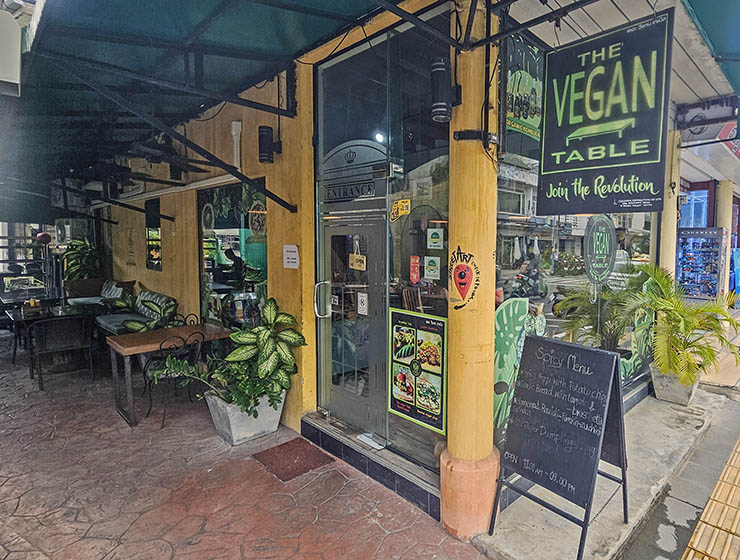
Even further east, via Phangnga Road, Ubuntu EAT awaits. This Indian vegan cafe opened just this year, but it already attracts raving fans. Beyond just a selection of masala (from chycken to fysh and sawsage), they also offer Thai and Lebanese options, kebab, biryani, salad and smoothie bowls. Expect to pay between 200 and 300 baht per person.
Food apps in Phuket
If you’d rather enjoy your veggie feast in your cozy accommodation (or any address in Phuket of your choice), you’re in luck. Phuket’s food delivery game is strong – there are simple, fast, and reliable services that can bring food to your doorstep. The delivery is often free, plus you can score a discount or a promotion.
The most popular food apps in Phuket are Foodpanda, GrabFood, Weserve, Lineman, and Aroi Dee. Most often, they present their menus in both Thai and English, so you won’t accidentally order spicy squid on a no-meat day. You can pay with cash or credit cards.
Conclusion: Celebrating Phuket Vegetarian Festival through food
As you meander through the bustling Phuket street food market, the squeaky chicken in the hands of a lady selling a variety of fun gimmicks is the only animal you’ll hear crying. In The Land of Smiles, walking through this vegetarian food paradise testifies that, for truly gastronomic hospitality, no animal has to hurt.
Phuket Vegetarian Festival transcends the boundaries of food and dives deep into the spiritual traditions of the local Chinese community
If you want to taste what Phuket is all about, visiting the town during the Phuket Vegetarian Festival will give you a solid overview. More than just a family event with culinary delights, this celebration carries the weight of Thailand’s rich cultural heritage.
Sure, any food lover would enjoy indulging in everything from savory street snacks to hearty vegan meals and delicate desserts. These will all captivate and delight the senses.
But Phuket Vegetarian Festival transcends the boundaries of food and dives deep into the spiritual traditions of the local Chinese community. These authentic and complex traditions remind us that our outputs relate to our inputs. We are what we consume.
Whether you’re a committed vegetarian or just a curious foodie, the Phuket Vegetarian Festival will take you on a truly immersive and unforgettable culinary journey. If you’re open to different interpretations, maybe cleansing your habits once in a while can even bring a blessing.
Did you like this guide to the Phuket Vegetarian Festival food?
Pin it for later!
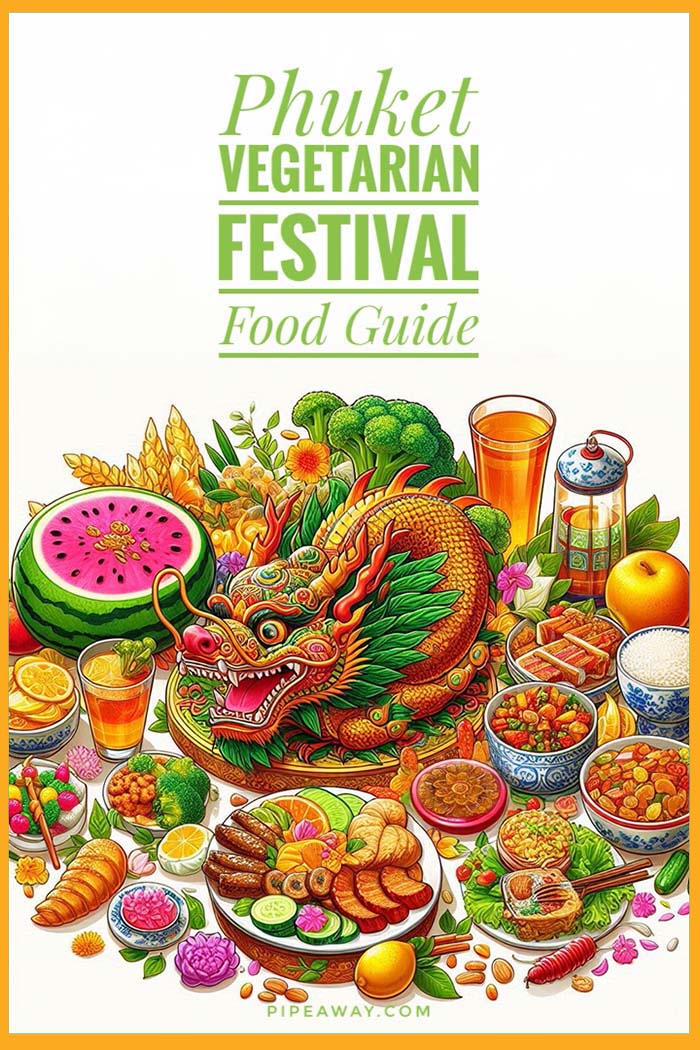
Disclosure: This post may contain affiliate links, meaning if you click on them and make a purchase, Pipeaway may make a small commission, at no additional cost to you. Thank you for supporting our work!

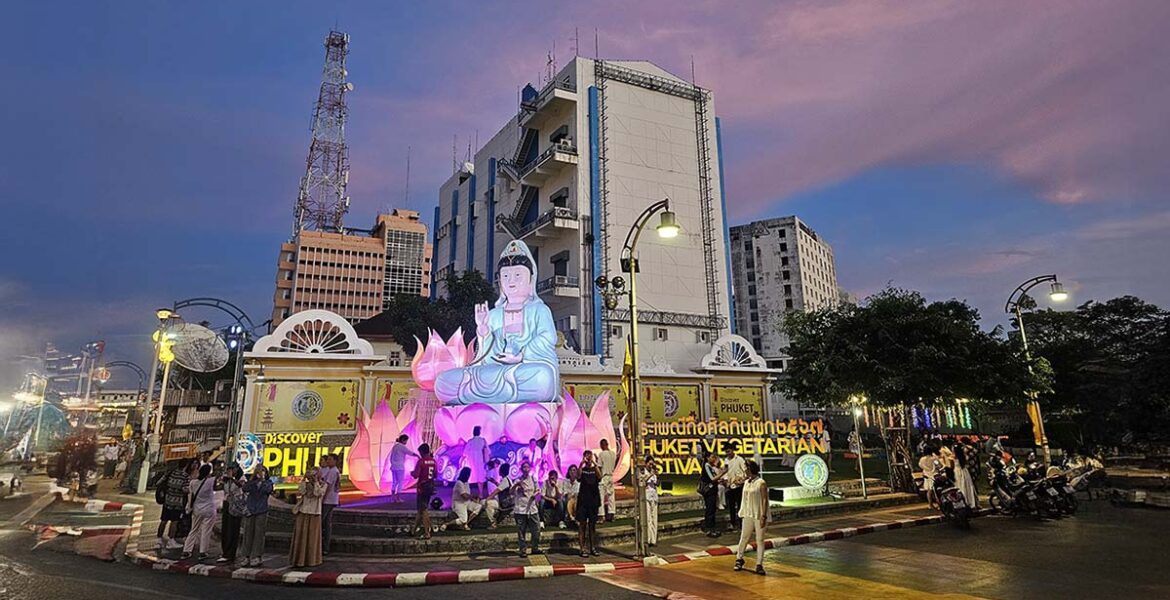

Thanks for including the history of the festival. I like the story of the opera troupe recovering by eating vegetarian food!
Thanks for your comment, Sonia!
It’s amazing how the troupe’s simple shift to vegetarian food evolved into this massive, spirited celebration.
Glad you enjoyed the article!
It looks amazing. Watching the video made me hungry. With so many variations of food, it must have been hard to choose what to eat. Great experience.
Thanks, Nat!
It was definitely a challenge to choose – every stall seemed to have something unique and tempting!
I get into this analysis paralysis, trying to pick the best option, while simultaneously getting hungrier and hungrier.
Once I do end up with a decision, I need to go back to the stall I saw half an hour ago, and finding it at such big events is a demanding task in itself 🙂
Glad you enjoyed the video!
I’m one of those meatarians, but I would definitely seek out traditionally prepared vegetarian food if I attended this festival. The Taoist connection to this festival is fascinating!
Even for die-hard meatarians, the festival’s traditional vegetarian dishes are hard to resist, especially with all the rich flavors and creativity.
And yes, the Taoist origins add such a unique layer to it all — it’s like a cultural deep dive, with a side of amazing food!
Would be awesome to see you give it a try, Darla!
My vote is the vegetarian phad thai is another version of the yummy thing. I love Thai food. And Thailand. I’ve been to only Phuket and it was in March so I had no idea they did this for a few days in October. So cool. I totally would have gone for the new thing vs keep walking but it’s also my opinion if you aren’t exploring a destination via it’s food, you’re doing it wrong! 😉
Absolutely, Heather!
The vegetarian Pad Thai is a total winner, right?
And I couldn’t agree more – food is hands down one of the best ways to dive into a culture!
It’s amazing how the whole of Phuket transforms in October for this festival; you’d have so much fun with all the new dishes to try. Guess it’s a good reason for a return trip?
I’m a meat-eater, but I do enjoy vegetarian fare on occasion. I’ve been to Phuket several times, and I’ve had some very good food there. I was also lucky enough to have hotels arrange cooking classes for me on four different occasions!
That sounds incredible, Michael!
Those cooking classes must have been so much fun (and delicious)!
And hey, if you’re ever back in October, the vegetarian festival is the perfect time to dive into the island’s plant-based offerings.
Interesting! I am not a vegetarian and love my chicken and eggs. But I also love pure vegetarian foods, So that vegetarian Pad thai actually sounds good to me!. There are devotees in many parts of the world who follow religious rituals like very restricted lifestyle to avoid pleasures of life (smoking, drinking, etc) in addition to vegetarian or vegan diets during some periods. But that cheek-piercing does not sound good! Haha! Great blog post!
Thanks, Jan!
You’re spot on about those rituals; it’s amazing how people around the world practice similar things for spirituality and self-discipline.
But yes, the cheek-piercing… that’s a level of devotion that might just be better to watch than try, haha!
So glad you enjoyed the post!